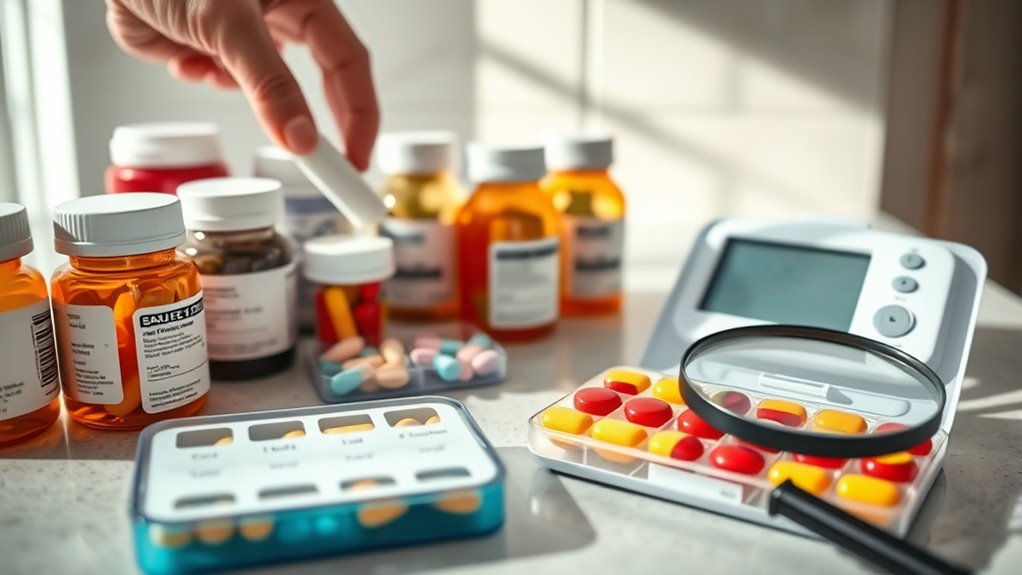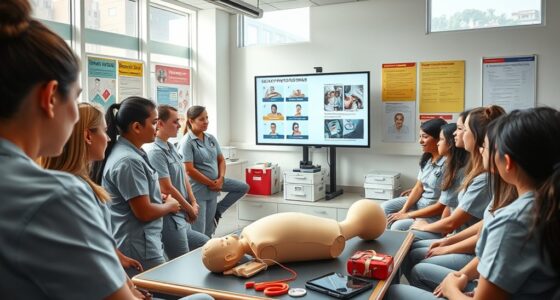To manage multiple medications safely, keep an updated list of all prescriptions, OTC drugs, and supplements, and share it with your healthcare providers. Use pill organizers, set reminders, and store medications properly in original containers away from children and pets. Regularly review your medications with your doctor to adjust dosages and eliminate unnecessary ones. Stay informed about potential side effects and interactions, ensuring you handle everything carefully to stay safe. If you want to learn how to stay on top of these steps, keep exploring further.
Key Takeaways
- Regularly review and update your medication list with healthcare providers to ensure safe, effective treatment.
- Organize medications using pill organizers and store them properly in original containers, out of children’s reach.
- Keep detailed records of dosages, instructions, and side effects; educate yourself about each medication.
- Use reminders like alarms or apps to take medications on time and monitor for adverse reactions.
- Communicate openly with healthcare providers about all medications, including OTC and supplements, and discuss potential interactions.
Understanding Your Medication Regimen
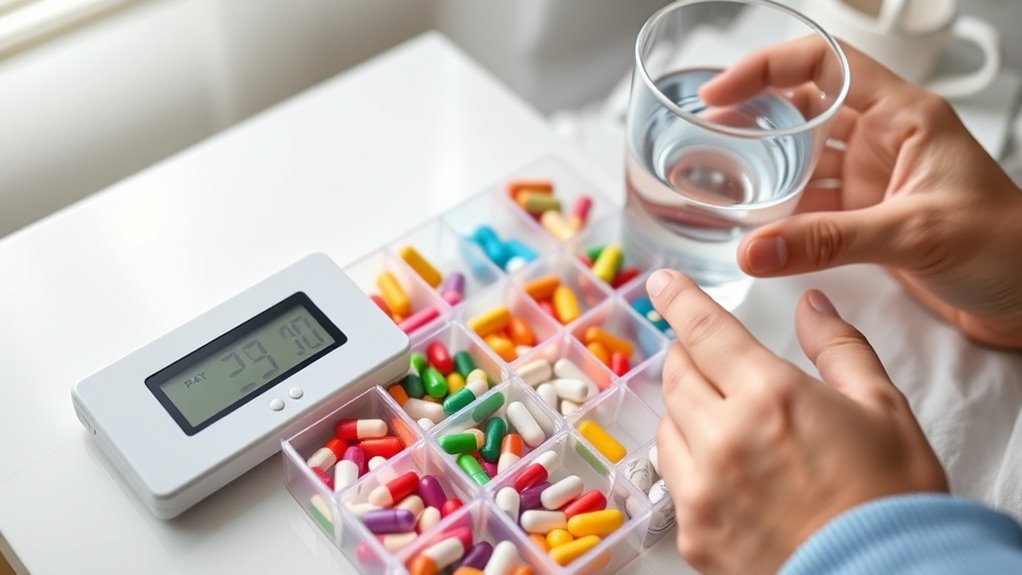
Understanding your medication regimen is essential for managing multiple medications safely. You need to be clear on dosage adjustments, which may change over time based on your health response. Keep track of your medication schedule to avoid missed doses or accidental double doses. Use a pill organizer or set alarms to help remember when to take each medication. Follow the prescribed timing precisely, as medication scheduling ensures maximum effectiveness and reduces side effects. If your healthcare provider adjusts your dosages, update your schedule immediately. Stay aware of any instructions regarding food, beverages, or other drugs that may affect your regimen. Regularly reviewing your medication plan enhances your medication management skills. By understanding these details, you take control of your health and minimize risks associated with taking multiple medications.
Keeping a Comprehensive Medication List
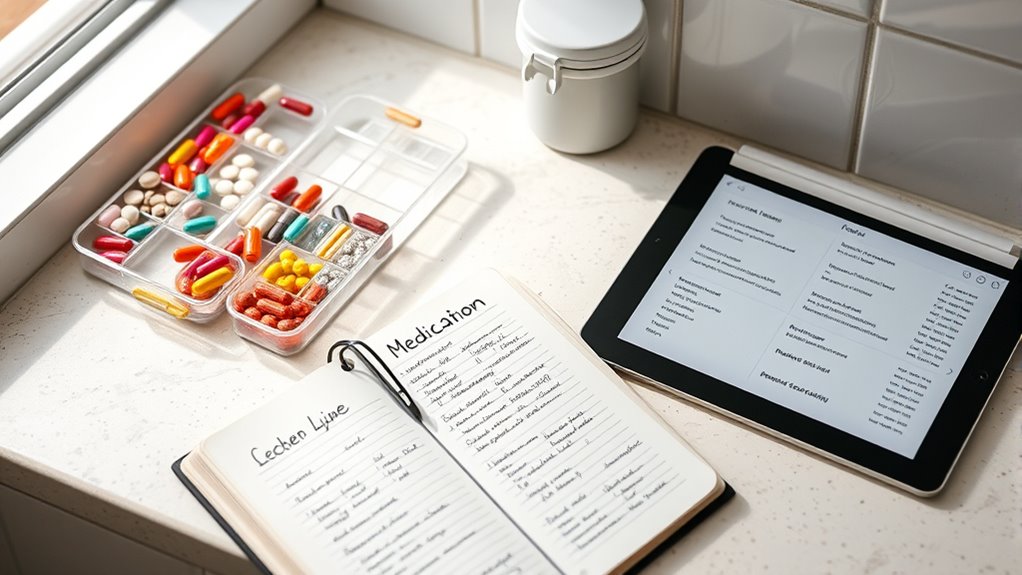
Keeping a thorough medication list is essential for your safety. You need to record all medication details accurately, update the list regularly, and share it with your healthcare providers. Doing so helps prevent errors and ensures everyone is on the same page about your treatment. It is also helpful to be aware of support hours at your healthcare facilities or pharmacies to assist in timely medication management.
Record Medication Details
Maintaining an accurate and up-to-date medication list is essential for managing multiple medications safely. You should record details like medication branding, which helps identify the exact product prescribed, and the dosage frequency to make sure you take your medications correctly. Include the medication’s name, strength, and how often you need to take it. This information helps you and your healthcare providers avoid errors, especially if you see different doctors or visit different pharmacies. Keep the list in a secure, accessible place, and update it whenever you start, stop, or change a medication. Having clear, detailed records also makes it easier to communicate with your healthcare team and reduces the risk of adverse interactions. Proper medication management is crucial for safety when handling multiple prescriptions.
Update Regularly
Regularly updating your medication list guarantees that your records stay accurate as your prescriptions change. After each medication review or dosage adjustment, take the time to revise your list. This helps prevent errors, such as missed doses or incorrect medications, which could lead to adverse effects. Keep track of any new prescriptions, discontinued medicines, or changes in dosing instructions. It is crucial to stay proactive, especially when your healthcare provider makes adjustments to your treatment plan. Eye Patch benefits can be relevant if you use such products alongside your medications. Consistent updates ensure you have an up-to-date reference for yourself and others involved in your care. By maintaining an accurate medication list, you reduce the risk of medication errors and improve your overall safety in managing multiple medications.
Share With Healthcare Providers
Sharing your thorough medication list with healthcare providers ensures they have the complete picture of your treatment. When your providers know all the medications you take, they can better support your medication adherence and avoid harmful interactions. Keep an updated list that includes drug names, dosages, and times taken. This not only helps in emergency situations but also improves patient education, so you understand why each medication is important. Regularly sharing this list during appointments ensures everyone stays informed about any changes. Being proactive about communication helps you stay safe and confident in managing your medications. Remember, clear and current information is key to effective treatment and minimizing risks. Your healthcare team relies on your shared details for superior care.
Using Pill Organizers Effectively
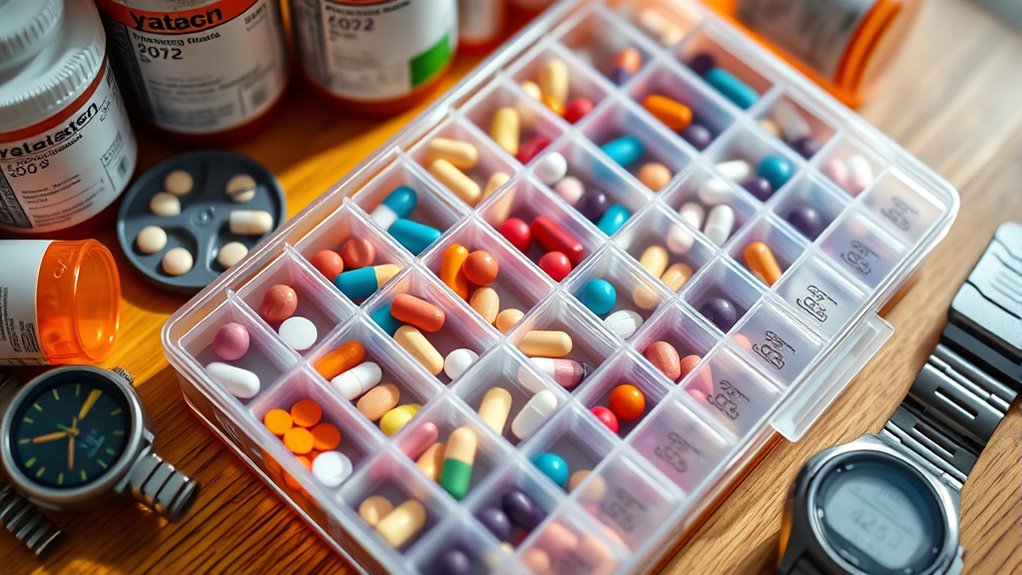
Using pill organizers can make managing multiple medications much easier and safer, especially when you need to take different doses at various times throughout the day. To maximize their effectiveness, follow some simple pill organizer tips, such as keeping compartments clean and clearly labeled. Proper medication compartmentalization helps prevent mix-ups and missed doses. Choose a pill organizer that fits your schedule—daily, weekly, or even hourly. Always fill your organizer once a week, preferably in the morning or after your pharmacy delivery, to avoid errors. Keep it in a consistent, visible spot to remind yourself. Remember, using a pill organizer isn’t just about convenience; it’s a vital part of medication safety. Stay organized, stay safe, and always double-check your doses before taking them. Studies show optimal angles can improve game longevity and ensure proper ball behavior, so consider this perspective when setting up your game space.
Setting Reminders and Alarms
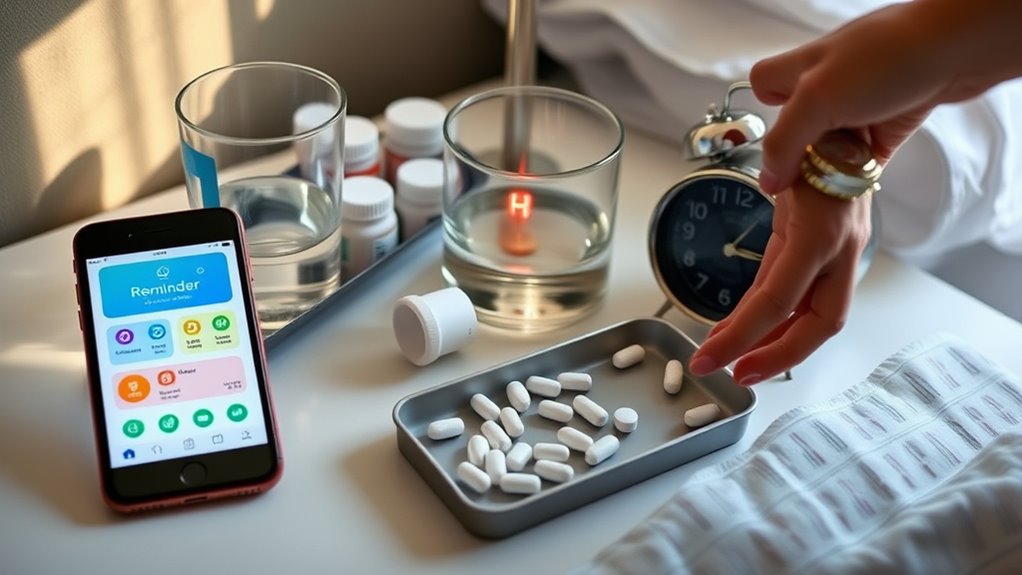
Setting reminders and alarms can markedly enhance your medication routine by ensuring you never miss a dose. Using pill reminder apps or alarm clock strategies keeps you on track effortlessly. Choose apps with customizable alerts and set alarms at your usual medication times. For example, you might use a dedicated pill reminder app, your phone’s alarm clock, or a smartwatch. Here’s a quick comparison:
| Method | Pros | Cons |
|---|---|---|
| Pill reminder apps | Custom alerts, tracking doses | Requires phone access |
| Alarm clock strategies | Simple, no extra app needed | Less personalized |
| Smartphone alarms | Easy, customizable | Can be silenced accidentally |
| Wearable devices | Hands-free, always accessible | Cost and setup required |
Additionally, understanding industry trends in health management tools can help you choose the most effective solutions. These tools help you stay consistent and safe.
Communicating With Your Healthcare Providers
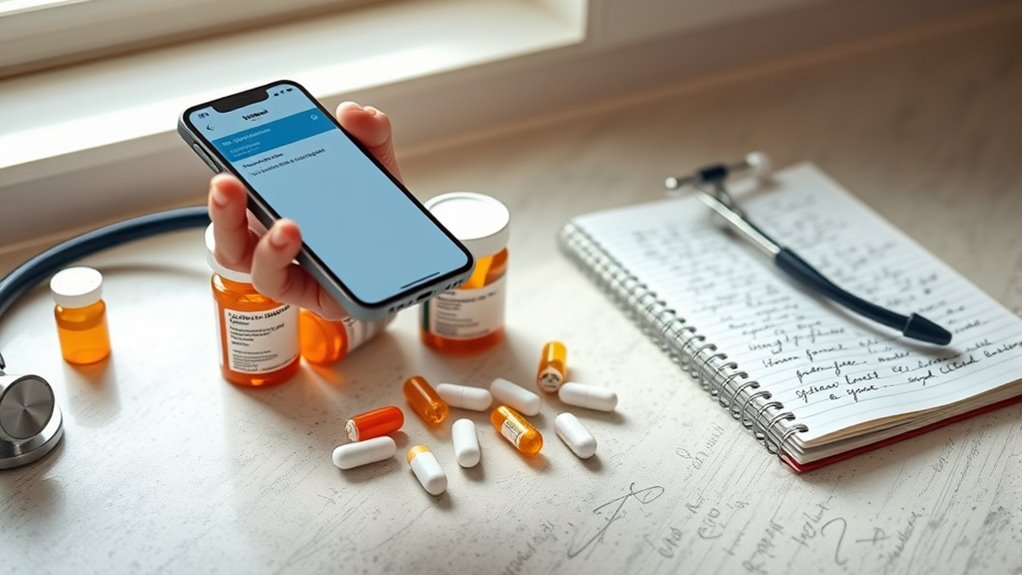
To manage your medications safely, it is crucial to communicate openly with your healthcare providers. Keep a current medication list, ask about potential interactions, and share any side effect concerns you experience. Clear conversations help ensure your treatment plan is safe and effective. Being aware of medication interactions can help prevent adverse effects and ensure optimal treatment outcomes.
Keep a Medication List
Keeping an up-to-date medication list is essential for effective communication with your healthcare providers. It helps guarantee medication adherence and smooth pharmacy communication. When your list is accurate, your providers can better review your treatments and avoid potential issues. To keep your list current:
- Record every medication, including over-the-counter drugs and supplements.
- Note the dosage, frequency, and reason for each medication.
- Update the list whenever you start, stop, or change a medication.
- Share this list with all your healthcare providers and your pharmacist at each visit.
- Regularly review your list to ensure medication safety and prevent harmful interactions.
Having a clear, organized medication list minimizes errors and keeps everyone on the same page. It’s a simple step that plays a big role in managing your medications safely and effectively.
Ask About Interactions
Do you know how different medications can interact and cause side effects or reduce effectiveness? Asking your healthcare provider about drug interactions is essential for medication compatibility. When you discuss your medications, be sure to mention all prescriptions, over-the-counter drugs, and supplements you’re taking. Your provider can identify potential interactions that might lead to adverse effects or lessen treatment benefits. Don’t hesitate to ask how each medication may affect others or if any adjustments are needed. Clear communication helps prevent harmful drug interactions and ensures your medications work as intended. Understanding factional unemployment can also help you navigate changes in your medication routine during periods of transition. Remember, your healthcare team is there to help you manage your medications safely—so always ask about potential interactions before starting or changing any medication.
Share Side Effect Concerns
Have you ever experienced side effects from your medications and wondered whether to mention them to your healthcare provider? Sharing your side effect concerns is vital for safe medication management. Here are four tips to help you communicate effectively:
- Be specific about your symptoms, noting when they started and how severe they are.
- Ask about drug interactions that could be causing or worsening side effects.
- Describe any changes in your daily routine that might influence side effects.
- Report persistent or severe issues immediately to prevent complications.
- Understanding medication safety can empower you to discuss concerns more confidently with your healthcare team.
Being Aware of Possible Drug Interactions
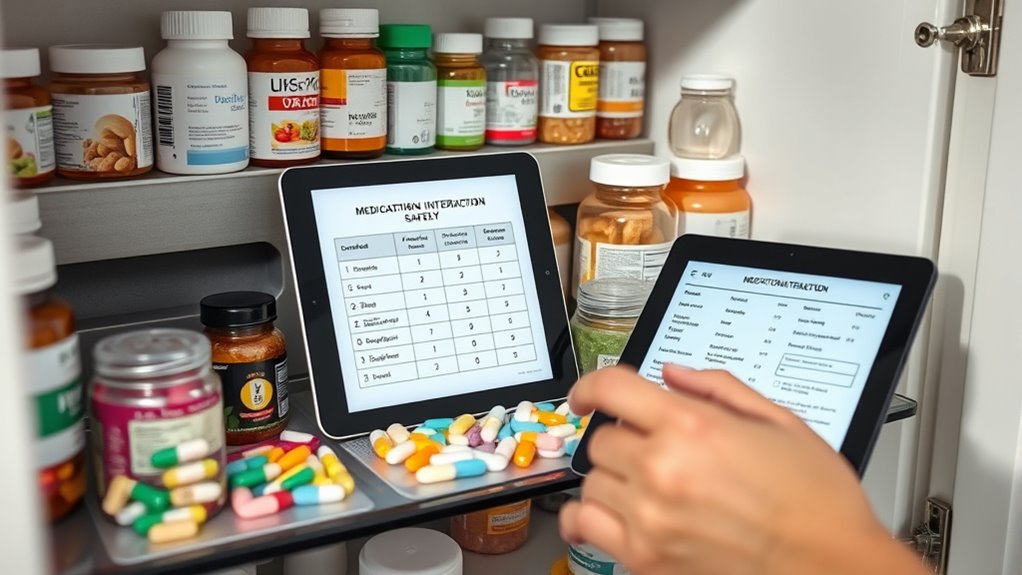
Understanding potential drug interactions is essential when managing multiple medications, as they can alter how drugs work or increase the risk of side effects. You should always monitor side effects closely and stay alert for any unusual symptoms. Recognizing allergic reactions early, such as rash, swelling, or difficulty breathing, is crucial to prevent serious complications. Before starting new medications, check for possible interactions with your current drugs by consulting your healthcare provider or pharmacist. Keep a list of all medications, including over-the-counter and supplements, and share it during appointments. Be cautious with alcohol and certain foods that may interact with your medications. Staying informed and vigilant helps minimize risks, ensuring your treatments work safely and effectively.
Managing Side Effects and Adverse Reactions

Managing side effects and adverse reactions requires you to stay attentive to how your body responds to each medication. Monitoring side effects helps you catch issues early, and recognizing adverse reactions can prevent serious health problems. To do this effectively, consider these steps:
- Keep a daily journal of any new or unusual symptoms.
- Note the timing of side effects in relation to medication doses.
- Communicate regularly with your healthcare provider about your experiences.
- Be alert for severe symptoms like difficulty breathing, swelling, or severe rash, which require immediate attention.
Proper Storage of Medications
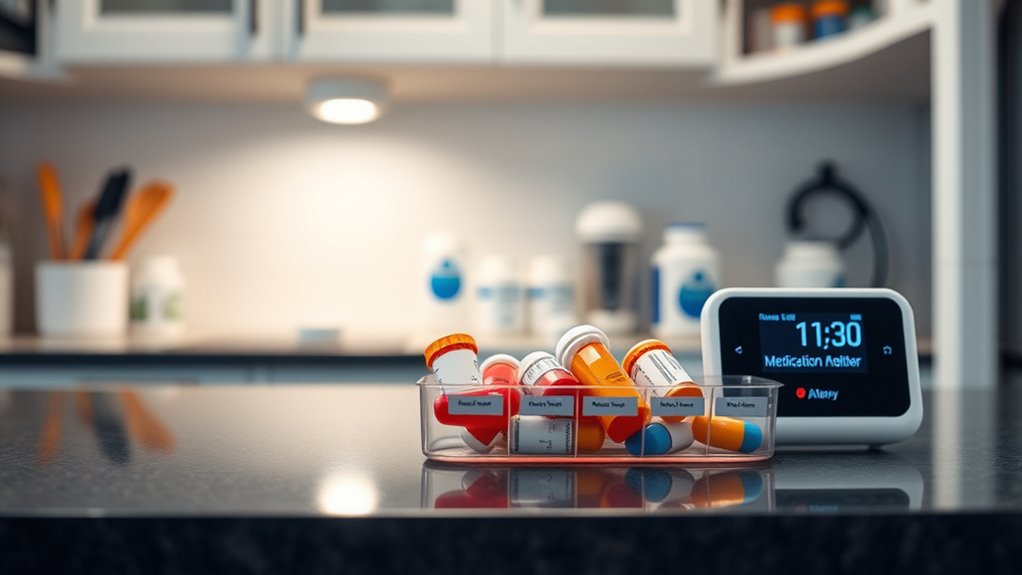
To keep your medications safe and effective, always store them in their original containers. Make sure to make certain to keep them out of reach of children and pets to prevent accidents. Proper storage helps guarantee you take your medications correctly and safely.
Store in Original Containers
Storing medications in their original containers guarantees that labels remain intact and important instructions stay clear. This helps you easily identify each medication and follow proper dosage instructions. Keep the containers tightly closed and store them in a safe, consistent location. To guarantee you’re managing your medications effectively, consider these tips:
- Check medication labeling regularly for updates or expiration dates.
- Follow the original container’s instructions for storage conditions.
- Avoid transferring pills to other containers to prevent confusion.
- Keep each container upright to prevent spills or damage.
Keep Medications Out of Reach
Keeping medications out of reach is a key step in ensuring safety, especially if there are children or pets in your home. Store all medications in childproof containers to prevent accidental ingestion. Always check medication labeling to verify bottles are properly sealed and clearly labeled, so you know exactly what’s inside. Place medications on high shelves or in locked cabinets that children cannot access. Avoid storing medications in common areas like the bathroom or kitchen counters where they’re easily reachable. Regularly review your medication storage to confirm nothing has been left within easy reach. Proper storage not only keeps medications safe but also helps prevent accidental poisoning and misuse. Taking these precautions ensures you’re protecting everyone in your household from potential medication-related accidents.
Regularly Reviewing and Updating Your Medications
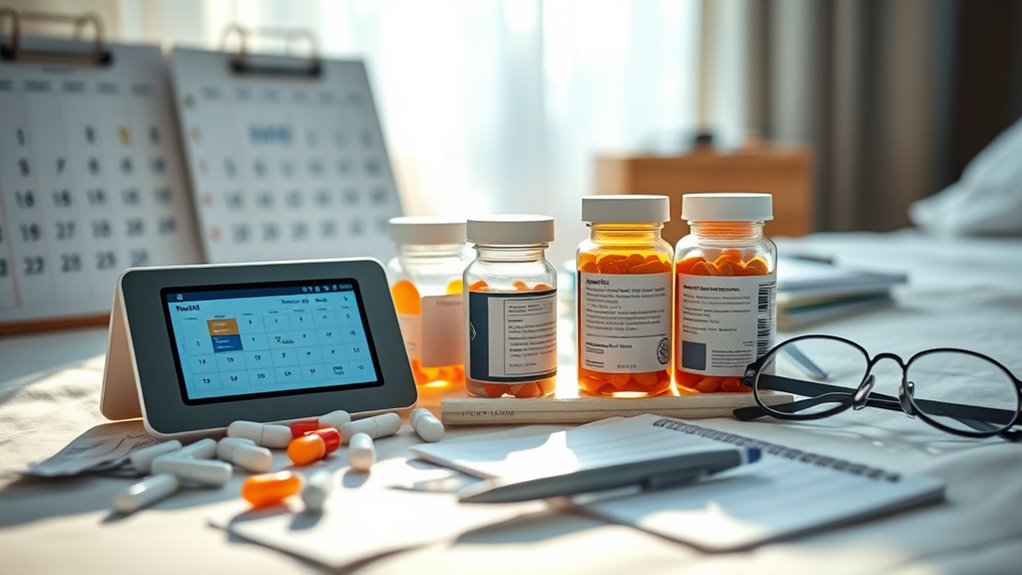
How often do you review your medications to make certain they still meet your health needs? Regular check-ins help ensure your treatments are effective and safe. Consider these steps:
Regularly review your medications to ensure they meet your current health needs and stay safe.
- Schedule annual appointments with your healthcare provider to review all medications and discuss any changes.
- Evaluate if medication holidays are appropriate, especially for long-term drugs, to prevent dependency.
- Update your list with any herbal supplement considerations, as some herbs can interact with your medications.
- Confirm that your prescriptions are still necessary and fit your current health status, making adjustments as needed.
Staying proactive with regular reviews can prevent adverse effects and optimize your treatment plan. Always communicate openly with your provider about any concerns or new supplements you’re taking.
Educating Yourself About Your Medications
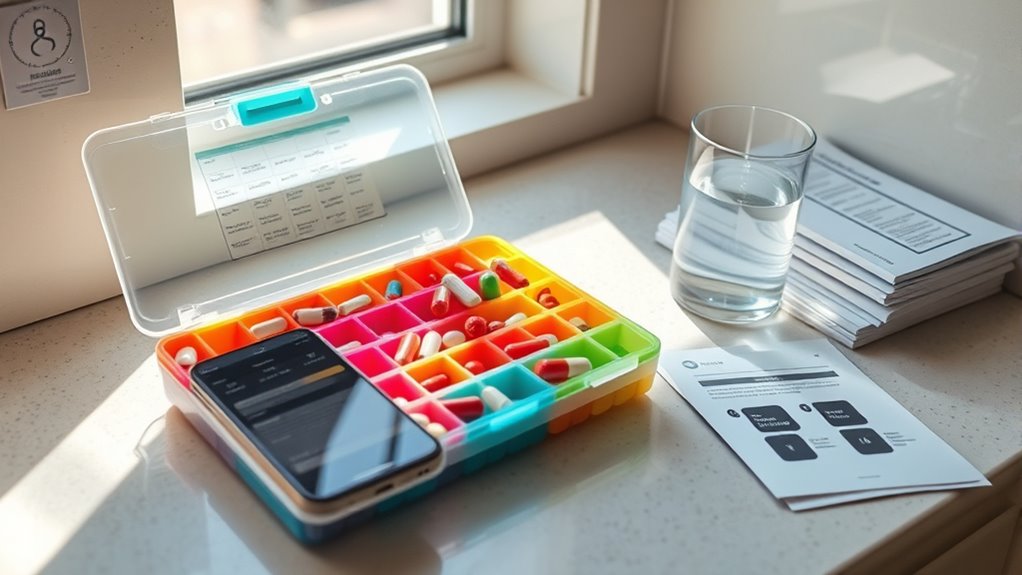
Understanding your medications is essential to managing your health safely. When you educate yourself about each medication, you improve your medication adherence, ensuring you take them correctly and consistently. Read the labels carefully, ask your healthcare provider questions, and understand why you’re prescribed each drug. Knowing about potential side effects helps you recognize adverse reactions early. Additionally, learning about medication affordability options can help you access your medicines without financial stress. Explore generic alternatives, patient assistance programs, or pharmacy discounts. Staying informed empowers you to make better decisions, communicate effectively with your healthcare team, and reduce the risk of errors. Ultimately, educating yourself about your medications supports safe, effective treatment and helps you stay on top of your health.
Frequently Asked Questions
How Can I Identify if I Am Allergic to a Medication?
You can identify if you’re allergic to a medication by watching for allergic reaction symptoms like hives, swelling, difficulty breathing, or rash. If you notice these, stop the medication and see a healthcare professional. They may recommend medication allergy testing to confirm the allergy. Always inform your doctor about any previous allergic reactions to medications to prevent future issues and guarantee safe treatment.
What Should I Do if I Miss a Dose?
Did you know that about 20% of patients miss doses? If you miss a dose, don’t panic. Check your medication instructions for specific guidance. Usually, you should take the missed dose as soon as you remember, but if it’s close to your next dose, skip it and stick to your schedule. Avoid doubling up, and consider consulting your healthcare provider for timing adjustments or further advice.
Are There Specific Precautions for Taking Medications With Food or Drinks?
You should always follow your healthcare provider’s instructions regarding food interactions and beverage considerations. Some medications need to be taken with food to prevent stomach upset, while others should be taken on an empty stomach for better absorption. Avoid certain drinks like alcohol or grapefruit juice unless approved, as they can interfere with medication effectiveness. Always read the label or ask your pharmacist to confirm you’re taking your medications safely with food or drinks.
How Do I Handle Expired or Unused Medications Safely?
Think of your medications as treasures that need safeguarding. When they expire or become unused, don’t keep them hidden; instead, follow proper medication disposal methods like drop-off programs or drug take-back events. Store your meds safely in a secure, labeled container away from children and pets. Proper medication disposal and safe medication storage protect your health and the environment, ensuring these treasures don’t fall into the wrong hands.
Can I Take Over-The-Counter Medicines With My Prescribed Drugs?
Yes, you can take over-the-counter medicines with your prescribed drugs, but you should always verify for potential drug interactions and any need for dosage adjustments. Consult your healthcare provider or pharmacist before adding new medications to ensure they won’t interfere with your current treatment. This helps prevent adverse effects and ensures your medications work effectively together, keeping you safe and healthy.
Conclusion
So, despite all these tips, managing multiple medications might still feel overwhelming. Ironically, the more organized you get, the more you realize how confusing it can be. But remember, staying proactive and informed isn’t just about avoiding mistakes — it’s about taking control of your health, even if it sometimes feels like a full-time job. After all, who knew that keeping track of pills could be the real exercise in patience?
